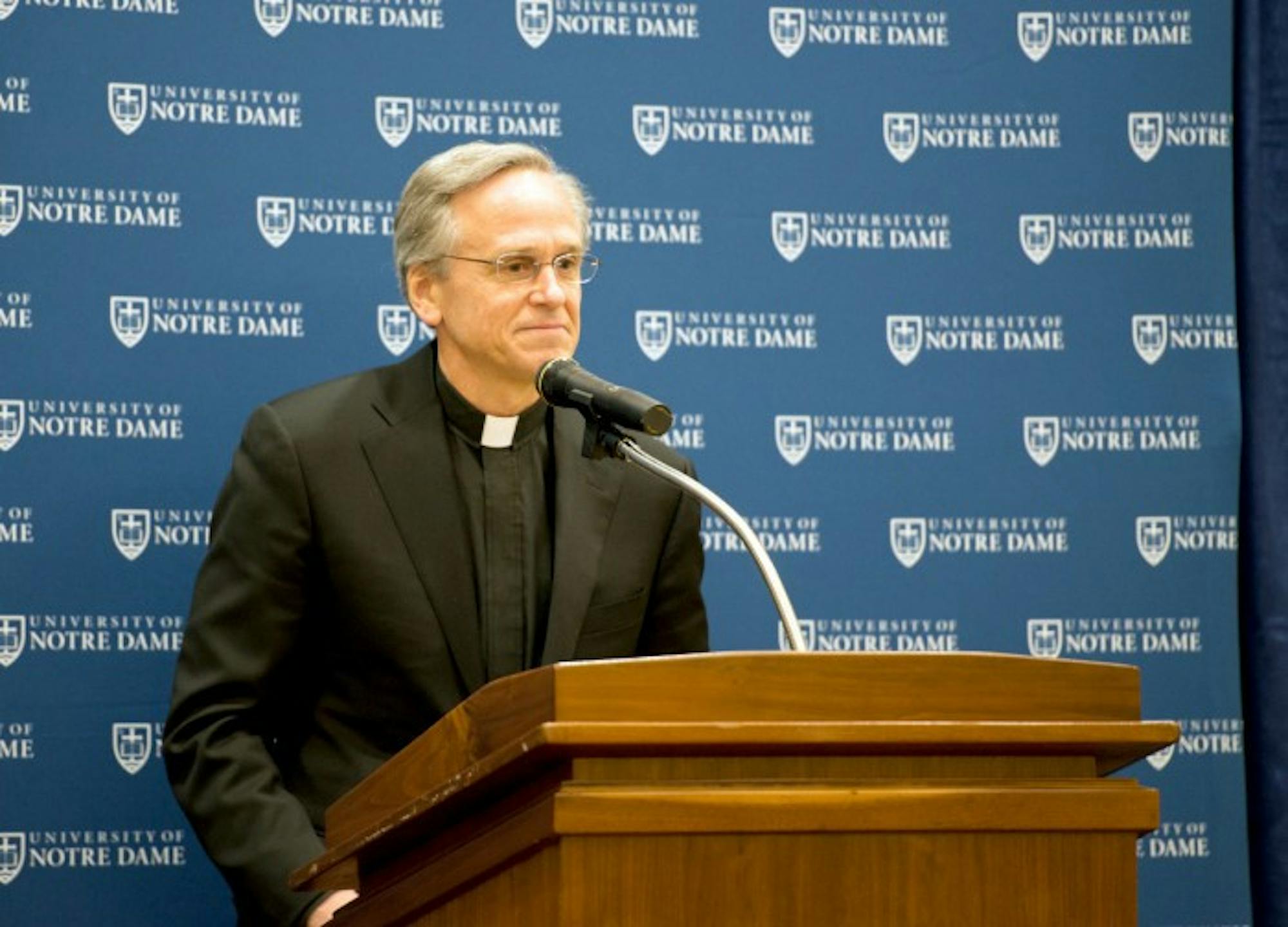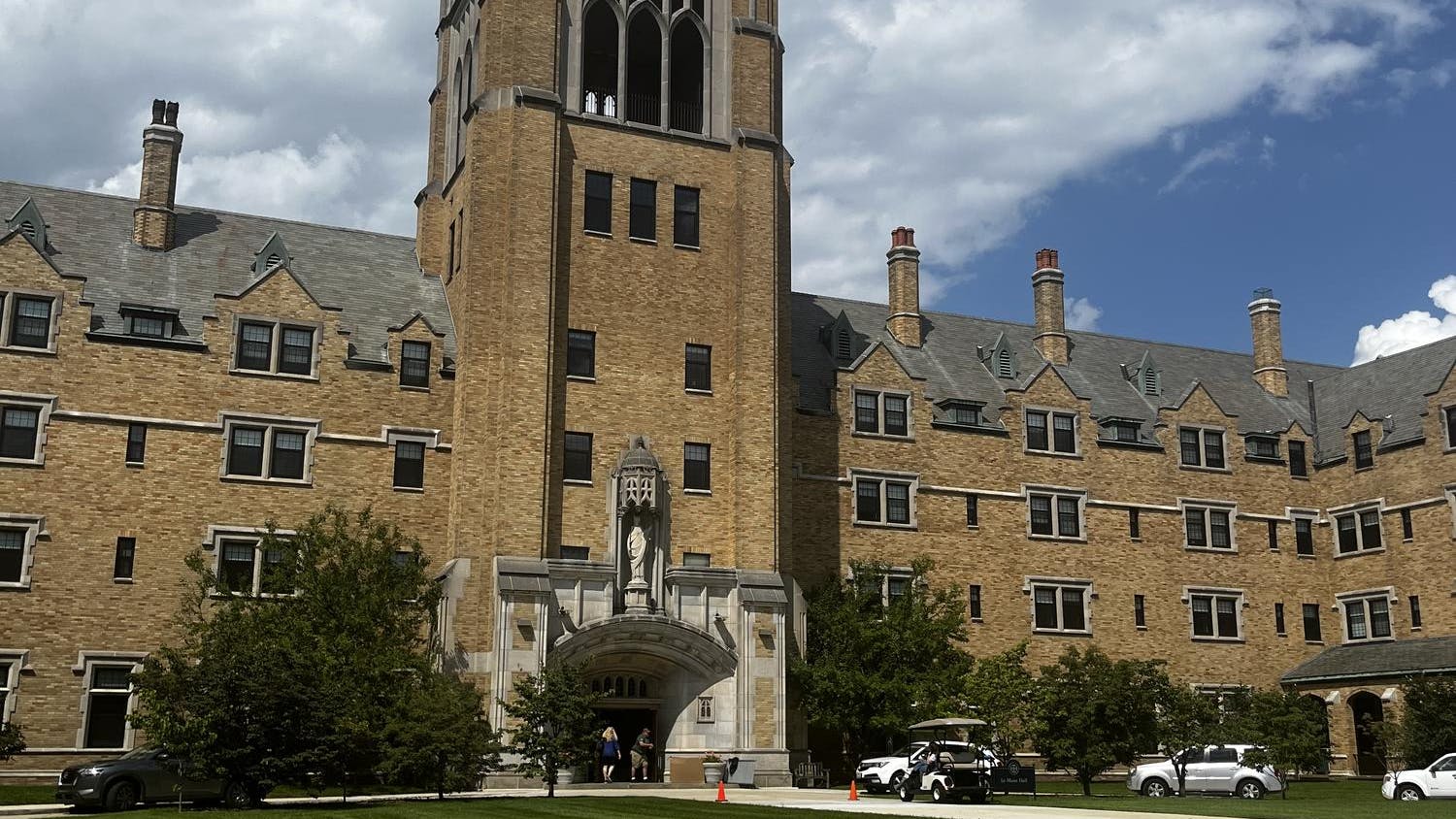Friday morning, with the news of University President Emeritus Fr. Theodore Hesburgh’s death just reaching many Notre Dame students, University President Fr. John Jenkins reflected on his time with the priest, who was 97, and outlined plans for services next week.

Emily McConville | The Observer
Emily McConville | The Observer
“I extended my heartfelt condolences to the Hesburgh family, to my brothers in the Congregation of Holy Cross, to the University of Notre Dame family and to all those whose lives were touched and enriched by Fr. Hesburgh’s remarkable life and ministry,” Jenkins said.
“Fr. Hesburgh was the 15th president of the University of Notre Dame, from 1952 until his retirement in 1987," he said. "Next to the University’s founder, Fr. Edward Sorin, no one had a greater impact on this University.”
Jenkins said Hesburgh, the longest-serving president of the University of Notre Dame, died at Holy Cross House late Thursday night. In an email to the resident assistants of Dillon Hall, rector Fr. Paul Doyle said Hesburgh celebrated Mass earlier that day, as was his daily custom.
“Fr. Ted had long prayed that God would allow him to say Mass on his last day on earth,” Doyle wrote. “Fr. Hesburgh did just that at 11:30 a.m. Thursday among his brothers in Holy Cross.”
On Hesburgh’s legacy:
Jenkins said Hesburgh’s influence extended well beyond the Notre Dame campus.“He was one of the nation’s most influential figures in higher education, the Catholic Church and national and international affairs,” Jenkins said. “Serving four popes and nine presidents, Fr. Hesburgh was a moral force in virtually all major social issues of his day, including civil rights, peaceful uses of atomic energy, campus unrests, third-world development and immigration reform.
“Whatever else we may say about Fr. Ted, he was a priest and a man of faith who had a confident hope in God’s love and the promise of eternal life. We believe he is now with the God he served so faithfully and in the arms of Notre Dame, Our Lady, whom he was so devoted to.
“Notre Dame lost a piece of its heart last night, but Fr. Ted lives on at Notre Dame and among the millions of lives he touched around the world.”
When asked how many visitors he expects will attend services next week, Jenkins said the full extent of Hesburgh’s influence would show in the support from the broader Notre Dame community.
“We expect a big turnout. We expect many people to come and many people notable people to come,” Jenkins said. “[Hesburgh] had the opportunity to outlive most of his contemporaries, so if he had died at an earlier age, I’m sure we would have even more people and more distinguished people.
“But even so, he was a genuine friend. Fr. Ted was the only person I know who’d come to breakfast in the morning and say, ‘The President called me last night.’
“He was friends with presidents and they would call him for advice. … My guess is that a number of people will come to celebrate this very life.”
On his relationship with Hesburgh:
Jenkins said his last interaction with Hesburgh was last Sunday, when they enjoyed a casual conversation and smoked cigars together.“He seemed in good spirits. He’s always been so encouraging about my work as president,” Jenkins said. “… He had become a great friend of my mother and he asked about my mother; we talked about Mom a lot.
“And so it was just a usual conversation and he — he was as jovial and excited about life as ever in that conversation.”
Jenkins reflected on the development of his relationship with Hesburgh, starting from his time as a student, when Hesburgh was President, to now.
“You know, I was a student in the 1970s when Fr. Hesburgh was president, and those were the days when he was very much involved in the national scene,” he said. “He had been very prominent in civil rights and segregation, obviously in the conferences in the ‘60s over the war, in the Catholic Church.
“… I did not know him when I was an undergraduate — I mean, personally — but he was an admired figure for me and an inspiration for me in so many ways," Jenkins said. "When I entered the Congregation of Holy Cross, I entered studies and I got to know him better.
“… [He] was still kind of a revered figure for me, but always encouraging, and he was a model for me as a priest, as a religious, as an academic, and I always looked up to him.”
Jenkins emphasized the impact Hesburgh had on the early years of his presidency and the best advice he received from his predecessor.
“When I became President, he became really a mentor, an advisor, a confidant in so many ways, and I had many conversations with him,” he said. “I remember one of the things he said that’s always stayed with me is ‘Stay close to the students.’ … He was loved by and he loved our students. So I took that advice … and I appreciated that.
Jenkins spoke on Hesburgh’s influence during the difficult moments of his presidency, highlighting Hesburgh's relationship with his mother.
“In challenging times, he was always there. He was always encouraging. I mentioned my mother — in 2009, we invited President Obama and there was a great deal of controversy about that, as you may recall,” Jenkins said. “He heard that that, you know, and it was a difficult time — but without asking me, talking to me, he called my mom, just to say … this would turn out well. They became best friends from that day and that’s … Fr. Ted. He cared about people.”
On the week before Hesburgh’s death:
Jenkins said Hesburgh’s death, though not expected, came after a period of deteriorating health for the priest.“Fr. Hesburgh … lost his sight to macular degeneration,” Jenkins said. “He was slowing down but he had good days and bad days.
“I think he was going to [his office in the Hesburgh Library] until, I believe, last week. He celebrated Mass daily; he had a cigar daily. He was very engaged.
The past week, he seemed to slow down a bit. He wasn’t going to the office. We knew when he wasn’t going to the office that that was a sign.
“He was actually, even yesterday I’m told — I didn’t see him yesterday — but I’m told he was engaged, talking to people, seemed okay but in the evening seemed to struggle to breathe and passed away a little bit before midnight.”
On upcoming services:
A private wake will be held Tuesday at 7:30 p.m., according to Paul Browne, vice president for public affairs and communications.Visitation in the Basilica of the Sacred Heart will take place beginning 12 p.m. Tuesday and pausing at 6 p.m. for the wake. Visitation will resume at 9 p.m., continue “through the night” and end at 10 a.m. Wednesday.
The Congregation of Holy Cross will hold a private, traditional funeral Mass in the Basilica of the Sacred Heart on Wednesday at 2 p.m. A public procession to the Holy Cross Cemetery will follow.
A public tribute to Hesburgh will take place at 7:30 p.m. in the Joyce Athletic and Convocation Center. It will be free and ticketed.













